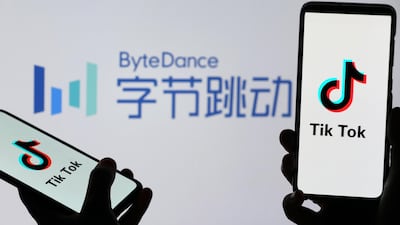ByteDance, the Chinese owner of TikTok, asked the federal appeals court in Washington to intervene to prevent the US government from requiring it to sell the popular video-sharing app or face a ban in America.
The Beijing-based company is seeking to block an order forcing it to sell by Thursday its most important international business, a viral video service with upwards of 100 million users in the US. The Trump administration issued an executive order banning TikTok in the US on national security grounds, and demanded the Chinese company cede control of TikTok to American investors.
A deal was eventually struck to sell about 20 per cent of a new TikTok entity to Oracle and Walmart, but that agreement is now in limbo after Joe Biden won the US presidential election and a legal challenge to the Trump administration’s ban. A US security panel had previously set a November 12 deadline for TikTok to finalise an accord, and TikTok has requested a 30-day extension to keep working toward a solution that would avert a full sale of TikTok as required in the order.
That request went unanswered, though TikTok is hoping that regardless of the outcome of Tuesday’s petition, an extension could still be granted, a person familiar with the process said.
Facing the Thursday deadline set by the Committee on Foreign Investment (Cfius in the US, TikTok said, it had no choice but to turn to the appeals court “to defend our rights and those of our more than 1,500 employees in the US”. ByteDance said the divestment order violated its due process rights as well as rules of administrative procedure that require the government to explain its reasoning for regulatory decisions.
“For a year, TikTok has actively engaged with Cfius in good faith to address its national security concerns, even as we disagree with its assessment,” TikTok said in a statement. “In the nearly two months since the president gave his preliminary approval to our proposal to satisfy those concerns, we have offered detailed solutions to finalise that agreement — but have received no substantive feedback on our extensive data privacy and security framework.”
The US contends that TikTok is a national security threat, saying it could give China’s government access to the personal data of millions of Americans because it’s owned by a Chinese company.
Tuesday’s court filing includes a letter written by Cfius explaining the government’s national security concerns with ByteDance’s ownership of TikTok, the first time those concerns have been made public in such detail.
The July 30 letter from the Treasury Department is based on unclassified information, though Cfius said its determination was also based on classified information.
Cfius also said ByteDance stores user data on servers hosted by China’s Alibaba and cited press reports that Alibaba actively supports the Chinese government’s intelligence and surveillance efforts.
As it faced criticism earlier this year from US President Donald Trump and the order to find a buyer for its American operations, TikTok had been in talks with a number of potential suitors, including Microsoft, though eventually ByteDance selected the dual proposal from software maker Oracle and retail giant Walmart.
In its petition Tuesday, ByteDance said that it submitted a new proposal on November 6 that called for a restructuring of TikTok in the US and the creation of a new entity that would be wholly owned by Oracle, Walmart and existing US investors. Mr Trump has voiced support for such an arrangement. The new company would be responsible for handling data and content moderation for US users, ByteDance said.
ByteDance has already won court orders blocking a set of prohibitions on TikTok that Mr Trump unveiled in August. The prohibitions that TikTok has successfully halted in court would have also gone into effect immediately on November 12, preventing new users from downloading the app and forbidding companies from providing the underlying web services that make it accessible.
But its petition on Tuesday targeted a separate process: an order by Cfius requiring it to divest TikTok by November 12. The implications of the divestment order are less clear. The language of the order gives the attorney general authority to “take any steps necessary” to enforce the order. The Justice Department didn’t respond to a request for comment.

